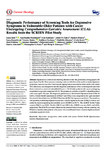Diagnostic Performance of Screening Tools for Depressive Symptoms in Vulnerable Older Patients with Cancer Undergoing Comprehensive Geriatric Assessment (CGA): Results from the SCREEN Pilot Study
| dc.contributor.author | Tack, L | |
| dc.contributor.author | Maenhoudt, A-S | |
| dc.contributor.author | Ketelaars, L | |
| dc.contributor.author | De Zutter, J | |
| dc.contributor.author | Pinson, S | |
| dc.contributor.author | Keunebrock, L | |
| dc.contributor.author | Haaker, L | |
| dc.contributor.author | Deckmyn, K | |
| dc.contributor.author | Gheysen, M | |
| dc.contributor.author | Kenis, C | |
| dc.contributor.author | Wildiers, H | |
| dc.contributor.author | Depoorter, L | |
| dc.contributor.author | Geerts, P-J | |
| dc.contributor.author | Chandler, R | |
| dc.contributor.author | Boterberg, T | |
| dc.contributor.author | Schofield, P | |
| dc.contributor.author | Parris, CN | |
| dc.contributor.author | Debruyne, PR | |
| dc.date.accessioned | 2023-02-13T10:49:18Z | |
| dc.date.available | 2023-02-13T10:49:18Z | |
| dc.date.issued | 2023-02-02 | |
| dc.identifier.issn | 1198-0052 | |
| dc.identifier.issn | 1718-7729 | |
| dc.identifier.uri | http://hdl.handle.net/10026.1/20273 | |
| dc.description.abstract |
<jats:p>Depression is a common and disabling disorder in later life, particularly among people with poor physical health. There are many screening tools available that can be used to examine depressive symptoms; however, not all of them may be appropriate or accurate for older adults with cancer. This pilot study was designed to test the diagnostic performance of two screening tools and their short versions in a cohort of vulnerable (G8 score ≤ 14/17) older patients with cancer undergoing comprehensive geriatric assessment (CGA). The prospective analysis covered 50 vulnerable patients with cancer aged ≥70 years. The diagnostic performance of the Geriatric Depression Scale (GDS)-15, GDS-4, Patient Health Questionnaire (PHQ)-9 and PHQ-2 was compared to the ‘gold standard’ Structured Clinical Interview for DSM-5 Disorders (SCID-5-S) depression module A. The sensitivity and specificity in detecting depressive symptoms were the highest in the case of PHQ-2, with an area under the receiver operating characteristic curve (AUROC) of 92.7%. The AUROC for the 9-item version, PHQ-9, was 90.2%. For the GDS-15 and GDS-4, the AUROC was only 56.2% and 62.0%, respectively. The SCREEN pilot study illustrates the potential benefit of using a shorter screening tool, PHQ-2, to identify older patients with cancer who would benefit from a more in-depth emotional evaluation as part of a CGA.</jats:p> | |
| dc.format.extent | 1805-1817 | |
| dc.format.medium | Electronic | |
| dc.language | en | |
| dc.language.iso | en | |
| dc.publisher | MDPI AG | |
| dc.subject | depression | |
| dc.subject | oncogeriatric | |
| dc.subject | older adults with cancer | |
| dc.subject | Patient Health Questionnaire | |
| dc.subject | Geriatric Depression Scale | |
| dc.title | Diagnostic Performance of Screening Tools for Depressive Symptoms in Vulnerable Older Patients with Cancer Undergoing Comprehensive Geriatric Assessment (CGA): Results from the SCREEN Pilot Study | |
| dc.type | journal-article | |
| dc.type | Article | |
| plymouth.author-url | https://www.ncbi.nlm.nih.gov/pubmed/36826101 | |
| plymouth.issue | 2 | |
| plymouth.volume | 30 | |
| plymouth.publication-status | Published online | |
| plymouth.journal | Current Oncology | |
| dc.identifier.doi | 10.3390/curroncol30020140 | |
| plymouth.organisational-group | /Plymouth | |
| plymouth.organisational-group | /Plymouth/Faculty of Health | |
| plymouth.organisational-group | /Plymouth/Faculty of Health/School of Nursing and Midwifery | |
| plymouth.organisational-group | /Plymouth/Research Groups | |
| plymouth.organisational-group | /Plymouth/Research Groups/Plymouth Institute of Health and Care Research (PIHR) | |
| plymouth.organisational-group | /Plymouth/Users by role | |
| plymouth.organisational-group | /Plymouth/Users by role/Academics | |
| dc.publisher.place | Switzerland | |
| dcterms.dateAccepted | 2023-01-30 | |
| dc.rights.embargodate | 2023-2-14 | |
| dc.identifier.eissn | 1718-7729 | |
| dc.rights.embargoperiod | Not known | |
| rioxxterms.versionofrecord | 10.3390/curroncol30020140 | |
| rioxxterms.licenseref.uri | http://www.rioxx.net/licenses/all-rights-reserved | |
| rioxxterms.type | Journal Article/Review |


